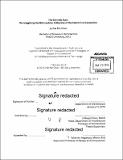The gerontic turn : re-imagining the metropolitan collective of the centennial generation
Author(s)
Chan, Pak Kin, M. Arch. Massachusetts Institute of Technology
DownloadFull printable version (35.23Mb)
Alternative title
Re-imagining the metropolitan collective of the centennial generation
Other Contributors
Massachusetts Institute of Technology. Department of Architecture.
Advisor
J. Meejin Yoon.
Terms of use
Metadata
Show full item recordAbstract
Coined as the 'longevity revolution', the global developed countries have witnessed an unparalleled extension to human longevity during the past 50 years. This dramatic increase in elongated morbidity, coupled with a declining fertility rate, will persist to see the world's elderly population of 60 and above reaching 2 billion by 2030. Beyond the concerns of economic pressures, broken pension schemes and infrastructural inadequacies, this magnitude of demographic shift only serves to exacerbate a much more fundamental problem with regards to how our institutions have socially constructed old age and death. While the institutionalization of retirement was legitimized in 1935 upon a meta-narrative of the golden years spending social security funds to indulge in sheer leisure at retirement homes, the upcoming generation of 60+ strives to remain healthy, active, engaged, and contributing members of society. The Boomers' retired lifestyle has undergone radical transformation since the 1980s, as activities previously considered exclusive to young adults - sports, sexuality, education, work, networking - are increasingly defined as prerequisites of successful aging. In other words, the socio-cultural imaginary of aging is increasingly elongated, pluralistic, unpredictable, but potentially purposeful, meaningful and fulfilling. The proposed thesis argues for a reexamination of the architectural and urbanistic production of spaces in the second half of life that continue to uncritically endorse the outlived paradigm of monastic hedonism. Instead of rationalizing the burden of distributing resources to take care of the elderly, how can we transform our urban environments to enable the motivated elders as proactive contributors of society? What are the programmatic combinations and typological reinventions that can engender new forms of productivity, social interactions and collectivity between the elderly and the rest of the populace? What are the spatial innovations in mobility and urbanity necessary to address the consequences of the aging process throughout time? This thesis will test new ideas of aging-in-the- city in South End, Boston, an increasingly gentrified and high-cost neighborhood occupied by a rapidly aging population with decreasing income levels. As more seniors elect to remain in Boston while another influx of suburban seniors yearn to move into the city, the urbanism and architecture of Boston will need innovative ways to sustain and empower its demographic diversity.
Description
Thesis: M. Arch., Massachusetts Institute of Technology, Department of Architecture, 2016. Cataloged from PDF version of thesis. Includes bibliographical references (pages 114-116).
Date issued
2016Department
Massachusetts Institute of Technology. Department of ArchitecturePublisher
Massachusetts Institute of Technology
Keywords
Architecture.